Traveling can be an exciting adventure, but figuring out how to carry money when traveling safely and smartly is crucial. Whether you’re backpacking through Europe or enjoying a luxurious getaway in Napa Valley, having a solid strategy for managing your finances ensures a smooth and stress-free experience. TRAVELS.EDU.VN is here to guide you on the best practices for safeguarding your funds while exploring new destinations. This involves considering various safety measures, understanding local customs, and leveraging technology to minimize risks and maximize convenience, letting you focus on creating unforgettable memories.
1. Why Is It Important to Strategize How to Carry Money When Traveling?
Carrying money safely while traveling is not just a matter of convenience, it’s a necessity for your peace of mind. Implementing strategic measures prevents theft and loss, ensures financial security in emergencies, and optimizes how you access funds in different regions.
- Prevents Theft and Loss: Taking preventative measures protects your money from pickpockets and theft.
- Ensures Financial Security: Diversifying your money storage helps maintain access to funds during unforeseen situations.
- Optimizes Access to Funds: Being strategic allows for easier transactions in various countries with different payment preferences.
2. How to Divide Your Money Effectively When Traveling?
Dividing your money into multiple locations is a fundamental safety tip. This strategy minimizes the impact of theft or loss, ensuring you always have access to some funds.
- Split Cash and Cards: Distribute your cash and credit cards into separate locations.
- Secure Hotel Storage: Leave a portion of your money in a safe or secure location at your accommodation.
- On-Body Storage: Keep some money on your person in hidden or secure accessories.
3. What Are the Best On-Body Storage Options for Travel Funds?
On-body storage is a secure way to carry money, offering a hidden layer of protection against theft. Modern options are discreet and comfortable, keeping your valuables close and out of sight.
- Money Belts: Classic but still effective, these are worn under clothing to conceal cash and cards.
- Hidden Pocket Clothing: Clothes with hidden zippered pockets can store cash and small valuables.
- Running or Workout Packs: Designed to be discreet, these packs can hold money and cards securely during activities.
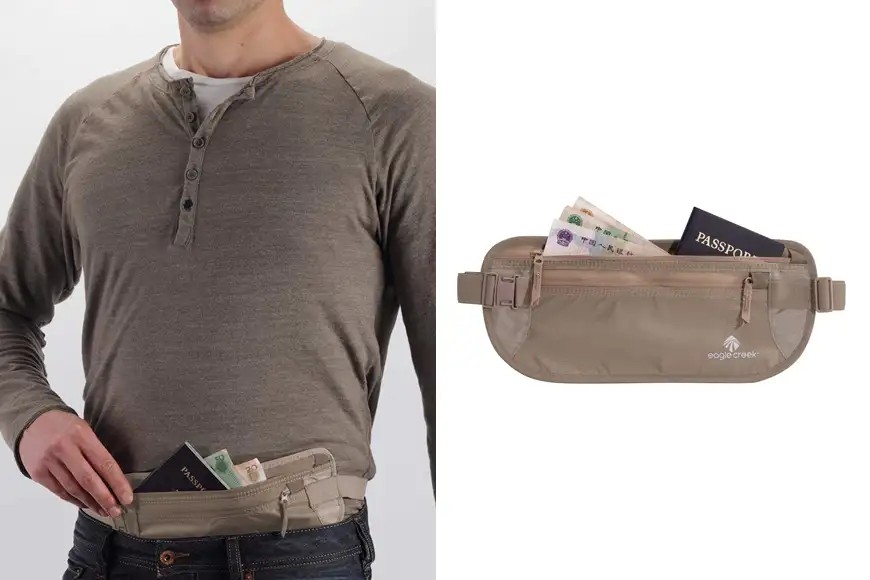 Eagle creek undercover hidden pocket
Eagle creek undercover hidden pocket
4. How to Keep Small Bills Accessible While Traveling?
Keeping small bills handy makes everyday purchases easier and reduces the need to expose large amounts of cash. This practice is especially useful in countries where cash is the primary form of payment.
- Morning Routine: Prepare your daily cash needs each morning.
- Small Denominations: Carry a mix of small bills and coins.
- Secret Stash: Keep larger bills separate and secure.
5. What Are Anti-Theft Bags and How Do They Protect My Money?
Anti-theft bags are designed with security features that deter pickpockets and thieves. These bags provide an extra layer of protection, keeping your money and valuables safe.
- Cut-Proof Straps: Steel-cable reinforced straps prevent slashing.
- Slash-Proof Fabric: Durable fabric resists cuts and tears.
- Locking Zippers: Zippers that can be locked to prevent easy access.
6. Why Should You Trim Your Wallet Before Traveling?
Reducing the contents of your wallet minimizes potential losses and lightens your load. Removing unnecessary cards and items simplifies your financial carry and reduces the hassle of replacement if lost or stolen.
- Remove Unnecessary Items: Take out cards you won’t need on your trip.
- Travel Lighter: A slimmer wallet is easier to manage and conceal.
- Minimize Replacement Hassle: Fewer items to replace if your wallet is lost or stolen.
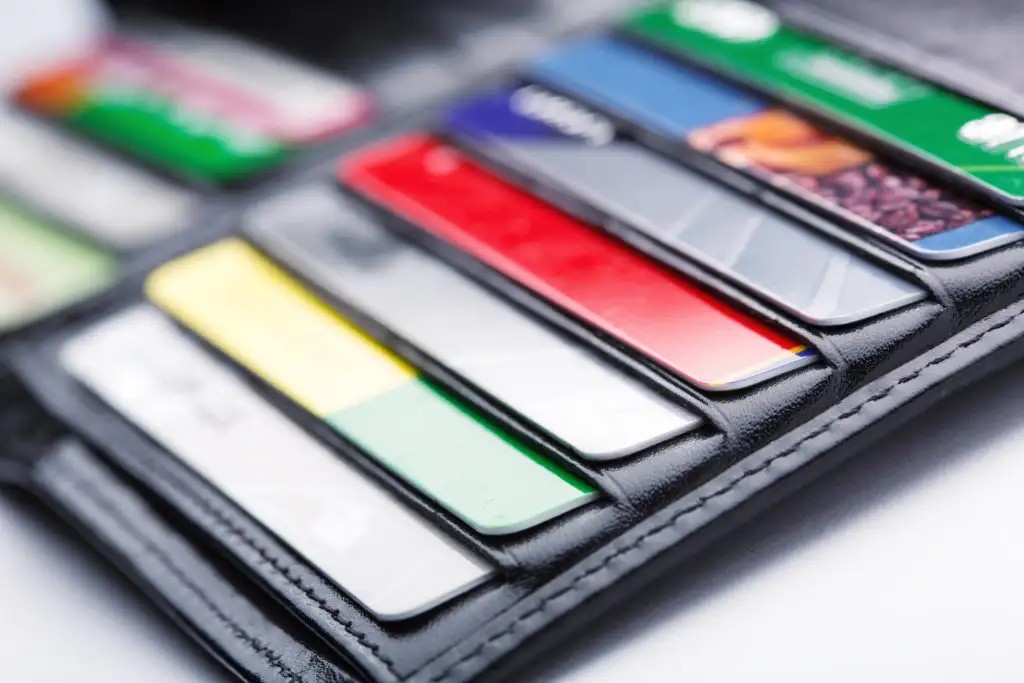 Open wallet with several credit cards
Open wallet with several credit cards
7. What is a Decoy Wallet and How Does It Work?
A decoy wallet is a cheap, realistic-looking wallet that you keep in an easily accessible place. It’s designed to be given to a thief in place of your real wallet, protecting your actual money and cards.
- Realistic Appearance: Looks real enough to fool a pickpocket.
- Small Bills and Fake Cards: Padded with a few small bills and sample credit cards.
- Pickpocket Deterrent: Can prevent thieves from finding your real wallet.
8. Why Use a Dedicated Travel Wallet?
A travel wallet is specifically designed for holding travel essentials. It helps keep your cards secure and organized, and prevents your everyday wallet from being overstretched.
- Secure Card Pockets: Snug pockets prevent cards from slipping out.
- Easy Transfer: Simplifies packing and unpacking for trips.
- Organization: Keeps essential travel documents and cards in one place.
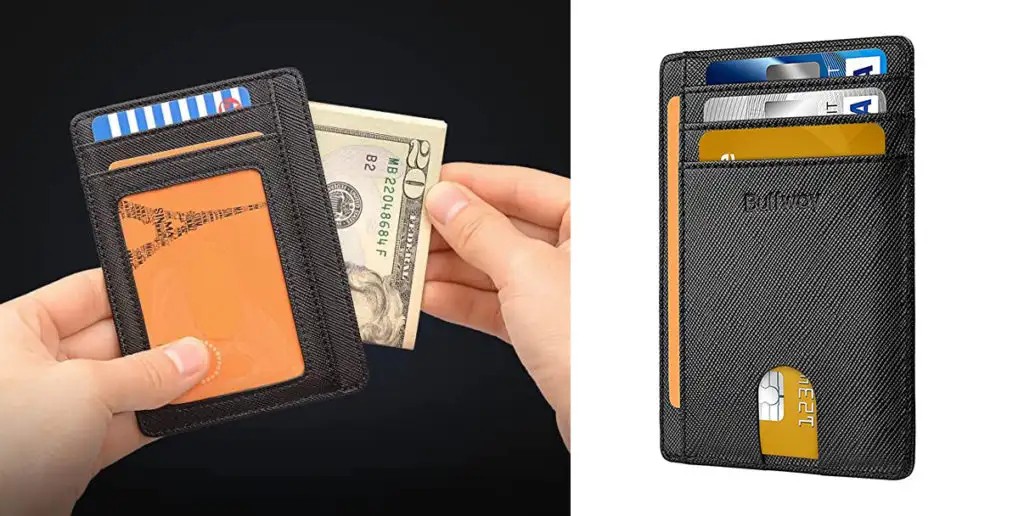 Person removing money from a thin wallet (left) and close up of same wallet (right)
Person removing money from a thin wallet (left) and close up of same wallet (right)
9. How Does Adapting to the Local Money Culture Help?
Understanding and adapting to the local money culture ensures you’re prepared for transactions. Knowing whether cash or credit is preferred, and being aware of local currency customs, makes your travels smoother.
- Cash vs. Credit: Know when to use cash and when to use credit cards.
- Currency Customs: Be aware of local tipping practices and common denominations.
- U.S. Dollars: In some countries, U.S. dollars are accepted, so keep some on hand.
10. What Money Alternatives Can You Use While Traveling?
Money alternatives such as multi-use tickets and contactless payment methods reduce the need to carry cash and cards. These options are convenient, efficient, and minimize the risk of loss or theft.
- Multi-Use Tickets: Public transportation cards like London’s Oyster card or San Francisco’s Clipper card.
- Contactless Payments: Use mobile payment apps where available.
- Prepaid Cards: Load money onto a prepaid card for specific expenses.
11. How Secure Is Storing Valuables in Hotel Safes?
Hotel safes offer a secure place to store valuables when not needed. They provide a reasonable level of security, but it’s always wise to double-check that you’ve retrieved your items before checking out.
- In-Room Safes: Generally secure for storing cash, jewelry, and important documents.
- Safe-Deposit Boxes: Offered behind the front desk for higher security.
- Reminder Notes: Leave notes to remind yourself to retrieve items before departure.
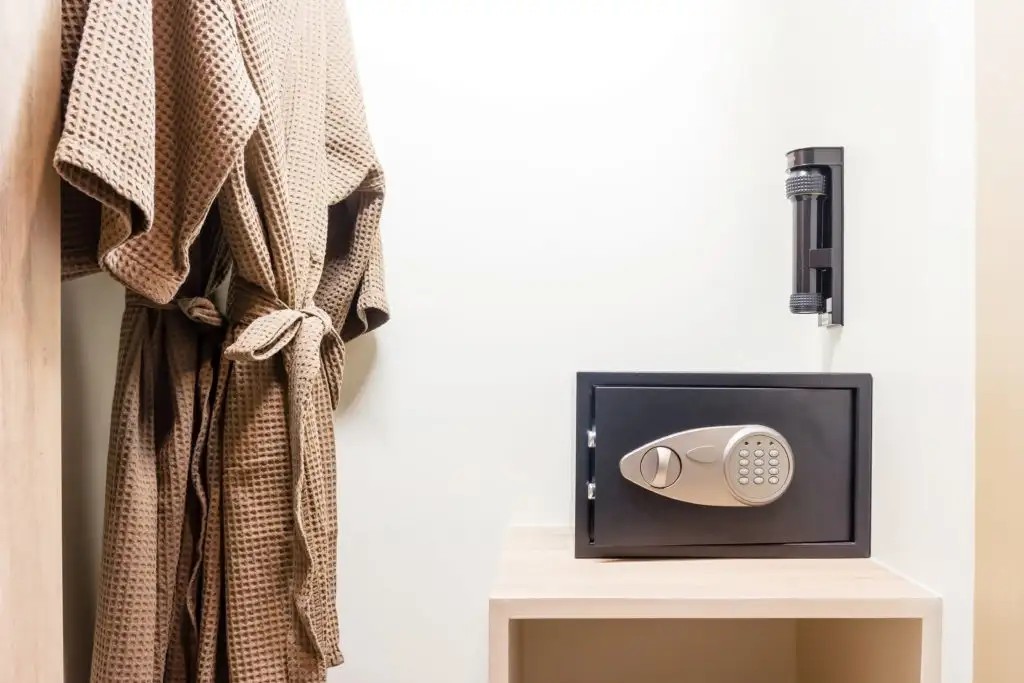 Hotel safe in a closet next to two hanging hotel robes
Hotel safe in a closet next to two hanging hotel robes
12. What Role Do Credit Cards Play in Safe Travel Finances?
Credit cards offer a secure and convenient way to pay for goods and services, but they also come with risks. By using credit cards wisely and taking appropriate precautions, you can maximize their benefits while minimizing potential downsides.
- Widespread Acceptance: Credit cards are accepted at a vast number of merchants globally, making them an extremely practical payment method.
- Fraud Protection: Credit cards often come with built-in fraud protection, providing recourse if your card is used without authorization.
- Travel Rewards: Many credit cards offer rewards programs specifically tailored for travelers, such as points, miles, and cashback on travel-related purchases.
- Emergency Funds: Credit cards can serve as a crucial source of funds in unexpected situations.
- Exchange Rates: Be mindful of exchange rates and any foreign transaction fees.
- Overspending: Credit cards can make it easy to overspend, leading to debt.
13. How to Use Mobile Payment Apps for Secure Transactions?
Mobile payment apps are increasingly popular for their convenience and security. They offer a touch-free way to pay, reducing the need to handle cash and cards.
- Convenience: Easily make payments with your smartphone.
- Security: Often use encryption and biometric authentication.
- Touch-Free: Reduce contact with surfaces.
14. How Can Travel Insurance Protect Your Finances?
Travel insurance can protect against financial losses due to theft, loss, or unexpected events. It provides a safety net, ensuring you’re covered in case of emergencies.
- Theft Coverage: Reimburses for stolen cash and valuables.
- Lost Item Coverage: Covers the cost of replacing lost items.
- Emergency Assistance: Provides financial support for medical emergencies and other unforeseen events.
15. What Are Some Common Travel Scams to Be Aware Of?
Being aware of common travel scams helps you avoid becoming a victim. Knowing how scams work allows you to stay vigilant and protect your money.
- Pickpockets: Be aware of crowded areas and keep your belongings secure.
- ATM Scams: Use ATMs in reputable locations and cover the keypad when entering your PIN.
- Fake Taxis: Only use licensed taxis or ride-sharing services.
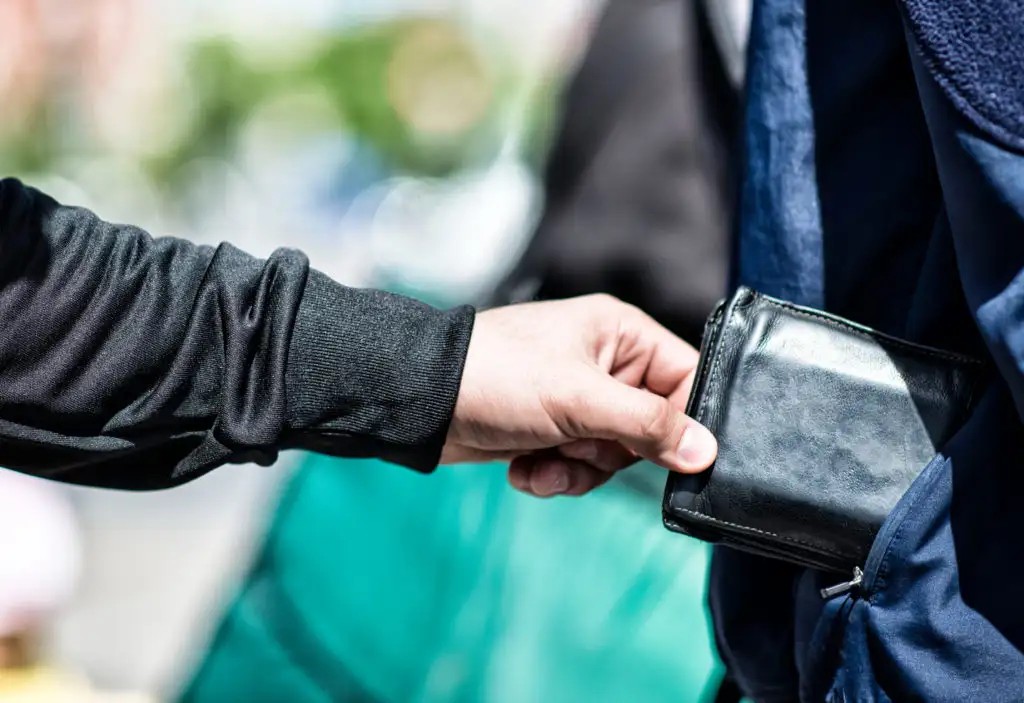 Close up of person stealing wallet from another person
Close up of person stealing wallet from another person
16. How Does Technology Aid in Managing Travel Finances?
Technology offers numerous tools for managing your money while traveling, from budgeting apps to currency converters. Using these tools can help you stay organized and in control of your finances.
- Budgeting Apps: Track your spending and stay within budget.
- Currency Converters: Easily convert currencies to understand local prices.
- Mobile Banking: Access your accounts and manage transactions from anywhere.
17. What Steps Should You Take If Your Money Is Stolen While Traveling?
If your money is stolen, taking immediate action can help minimize the damage. Reporting the theft and contacting your bank are crucial steps.
- Report the Theft: File a police report to document the incident.
- Contact Your Bank: Cancel stolen credit cards and report any fraudulent activity.
- Contact Travel Insurance: File a claim for reimbursement of stolen funds and items.
18. How Does Pre-Planning Help in Securing Your Travel Funds?
Planning ahead allows you to anticipate potential financial challenges and take steps to mitigate them. Thorough preparation ensures a smoother and more secure travel experience.
- Create a Budget: Plan your expenses and allocate funds accordingly.
- Research Local Customs: Understand local payment preferences and common scams.
- Make Copies of Documents: Keep copies of your passport, credit cards, and other important documents in a separate location.
19. Why is Napa Valley a Unique Case for Managing Travel Money?
Napa Valley, known for its luxurious experiences and high-end establishments, requires a slightly different approach to managing travel money. Here’s why:
- High-End Establishments: Many wineries, restaurants, and hotels in Napa Valley cater to a more affluent clientele, meaning that you will need to be prepared to pay higher prices for goods and services.
- Cashless Transactions: While some smaller establishments may still accept cash, most businesses in Napa Valley prefer credit or debit cards.
- Pre-Booking: Many experiences, such as wine tastings and tours, require advance booking and payment.
20. How Can TRAVELS.EDU.VN Enhance Your Napa Valley Trip?
TRAVELS.EDU.VN offers tailored services that make managing your travel funds in Napa Valley easier and more secure. From pre-arranged bookings to expert advice, we ensure a seamless experience.
- Customized Packages: We create bespoke Napa Valley travel packages that include pre-paid experiences, accommodations, and transportation, allowing you to manage your expenses upfront.
- Expert Advice: Our travel specialists provide personalized recommendations on how to handle your finances in Napa Valley, including tips on budgeting, payment methods, and local customs.
- Secure Bookings: We ensure that all bookings made through TRAVELS.EDU.VN are secure and protected, giving you peace of mind.
Napa Valley offers an unparalleled travel experience, and TRAVELS.EDU.VN can help make it even more special.
21. What Are Some Specific Tips for Carrying Money Safely in Napa Valley?
Given Napa Valley’s unique characteristics, here are some specific tips for managing your money safely:
- Credit Cards: Bring a reliable credit card with a high limit for expenses at wineries, restaurants, and hotels.
- Limited Cash: Carry a small amount of cash for tips, small purchases, or in case of emergencies.
- Pre-Bookings: Book accommodations, wine tastings, and tours in advance to secure your spot and manage your budget.
- Transportation: Consider hiring a private car or using ride-sharing services to avoid the risks associated with driving under the influence.
22. How Can You Leverage Local Resources for Financial Safety in Napa Valley?
Leveraging local resources can provide an extra layer of security and convenience while managing your travel funds:
- Local Banks: Familiarize yourself with local banks and ATMs for convenient access to cash.
- Concierge Services: Utilize concierge services at your hotel for recommendations on safe and reliable transportation, dining, and entertainment options.
- Visitor Centers: Visit local visitor centers for information on tourist scams and tips for staying safe.
23. What Considerations Should Couples and Groups Take When Managing Money While Traveling?
Couples and groups need to plan how to handle shared expenses and individual spending. Clear communication and agreed-upon methods ensure fairness and transparency.
- Shared Expenses: Determine how to split costs like accommodation, transportation, and meals.
- Individual Spending: Allocate a budget for personal expenses and activities.
- Payment Methods: Decide on a method for handling shared payments, such as a shared credit card or splitting costs evenly.
24. How To Carry Money When Travelling: Tips For Young Couples
Young couples traveling face unique challenges in managing travel finances, but with the right approach, they can ensure a seamless and budget-friendly experience.
- Budgeting Together: Collaboratively create a detailed budget prior to the trip, accounting for all anticipated expenses.
- Shared Travel Apps: Utilize travel apps designed for couples, allowing both partners to track expenses, split bills, and manage finances transparently.
- Couples Credit Card: Open a credit card specifically for travel, offering rewards and benefits tailored to couples, such as travel insurance, bonus points on dining, and shared spending limits.
- Flexibility: Embrace flexibility in budgeting, recognizing that unexpected expenses may arise.
- Compromise: Prioritize open communication and compromise on spending decisions to ensure mutual satisfaction.
- Experiences over Luxury: Opt for experiences and adventures over luxury accommodations and dining to maximize enjoyment while minimizing costs.
25. What are the unique travel considerations for experienced couples?
Experienced couples possess unique perspectives and priorities when it comes to managing travel finances, enabling them to craft enriching and fulfilling experiences.
- Prioritize Comfort and Convenience: Allocate a larger portion of the budget to accommodations, transportation, and dining that prioritize comfort, convenience, and accessibility.
- Premium Travel Rewards: Leverage premium travel credit cards and loyalty programs to unlock exclusive perks, such as airport lounge access, complimentary upgrades, and personalized concierge services.
- Invest in Unique Experiences: Splurge on immersive experiences that cater to shared interests, such as cooking classes, wine tastings, and guided tours led by local experts.
- Plan for Downtime: Incorporate downtime into the itinerary to allow for relaxation, reflection, and spontaneous exploration, fostering a sense of well-being and rejuvenation.
- Embrace Flexibility: Cultivate flexibility in travel planning to accommodate unforeseen circumstances.
- Communicate Openly: Maintain open and honest communication regarding financial expectations, preferences, and concerns.
26. How Can You Ensure Financial Safety for Group Travel
Traveling in a group can be an amazing experience, but managing finances for everyone can become challenging. Having clear guidelines and a well-thought-out strategy is essential for keeping things fair and stress-free.
- Designate a Treasurer: Choose one person in the group to be in charge of handling shared expenses. This person can collect money, keep track of spending, and make payments.
- Shared Spreadsheet: Use a shared online spreadsheet to keep track of who owes what. This makes it easier for everyone to see where the money is going and who needs to contribute.
- Set a Budget: Before the trip, have everyone agree on a budget for shared activities like meals, transportation, and accommodations. This way, everyone knows how much they are expected to spend.
- Payment App: Utilize payment apps like Venmo or Splitwise for easy money transfers. These apps make it simple to split bills and keep track of who owes what, ensuring that everyone pays their fair share.
- Discuss Preferences: Talk about everyone’s spending preferences beforehand. Some people may prefer to splurge on certain activities while others might want to save money where they can. Being aware of these preferences helps in making inclusive decisions.
27. How to protect your identity while travelling
Protecting your identity while traveling is crucial to avoid fraud and ensure a safe trip.
- Secure Documents: Keep your passport, ID, and other important documents in a secure, hidden place. Consider using a travel wallet or money belt.
- Digital Security: Use strong, unique passwords for your online accounts and enable two-factor authentication whenever possible. Avoid using public Wi-Fi for sensitive transactions.
- Credit Card Safety: Be vigilant when using credit cards. Keep an eye on your card during transactions and review your statements regularly for any unauthorized charges.
- Limit Personal Information: Avoid sharing personal information with strangers and be cautious about what you post on social media.
- Emergency Contacts: Keep a list of emergency contacts, including your bank and credit card companies, in case of theft or loss.
28. What are the most common money mistakes travellers make?
Many travellers make common money mistakes that can lead to unnecessary expenses and stress.
- Not Budgeting: Failing to create a budget can lead to overspending and financial strain.
- Ignoring Exchange Rates: Not understanding exchange rates can result in overpaying for goods and services.
- Relying on One Payment Method: Depending solely on cash or credit cards can be risky if one is lost or not accepted.
- Not Notifying Bank: Forgetting to inform your bank about your travel plans can lead to your card being blocked due to suspicious activity.
- Using Public Wi-Fi: Conducting financial transactions on unsecured public Wi-Fi networks can expose your information to hackers.
29. How can solo travelers manage money safely?
Solo travelers have unique concerns about managing money and ensuring their safety.
- Emergency Cash: Carry emergency cash in multiple hidden locations.
- Share Itinerary: Share your travel itinerary with a trusted contact at home.
- Stay Aware: Be extra vigilant about your surroundings and avoid drawing attention to yourself.
- Use Reputable ATMs: Only use ATMs located in secure, well-lit areas.
- Trust Your Instincts: If a situation feels unsafe, remove yourself immediately.
30. What are the most effective methods for sending money internationally?
There are several reliable methods for sending money internationally:
- Bank Transfers: Traditional bank transfers are secure but can be slow and expensive.
- Online Transfer Services: Services like PayPal, Wise (formerly TransferWise), and Remitly offer faster and often cheaper transfers.
- Money Transfer Apps: Mobile apps like Venmo (for domestic transfers) and Xoom (for international) provide convenient ways to send money.
- Money Transfer Companies: Companies like Western Union and MoneyGram have a wide network of agents, making it easy to send and receive money in person.
31. What is the role of a travel agency in safeguarding your funds?
Travel agencies play a significant role in safeguarding your funds by ensuring secure transactions and providing support in case of unforeseen events.
- Secure Payments: Reputable travel agencies use secure payment systems to protect your financial information.
- Financial Protection: Many travel agencies offer financial protection schemes that safeguard your money if the company goes out of business.
- Assistance with Refunds: Travel agencies can assist with obtaining refunds from airlines, hotels, and other service providers in case of cancellations or disruptions.
- Insurance Options: Travel agencies offer travel insurance policies that cover financial losses due to theft, illness, or other emergencies.
32. How To Carry Money When Travelling: The Future Trends
As technology advances, the future of managing travel finances will likely involve more seamless and secure solutions.
- Digital Wallets: Increased use of digital wallets and contactless payment methods.
- Blockchain Technology: Potential for blockchain to enhance the security and transparency of international money transfers.
- Biometric Authentication: Wider adoption of biometric authentication for secure transactions.
- AI-Powered Budgeting: AI-powered budgeting apps that provide personalized financial advice and real-time expense tracking.
- Cryptocurrencies: Growing acceptance of cryptocurrencies as a form of payment for travel-related expenses.
33. Frequently Asked Questions (FAQ) about How to Carry Money When Traveling
Here are some frequently asked questions to help you further understand how to carry money when traveling:
- What is the safest way to carry cash while traveling?
Dividing your cash into multiple secure locations, such as a money belt, hidden pockets, and a travel wallet, is the safest way to carry cash. - Should I exchange money before I travel?
It’s generally best to exchange a small amount of money before you travel to cover immediate expenses upon arrival. - What should I do if my credit card is stolen while traveling?
Report the theft to your bank immediately and request a replacement card. - Is it better to use a debit card or credit card while traveling?
Credit cards offer better fraud protection and may provide travel rewards. - How can I avoid ATM fees while traveling?
Use ATMs within your bank’s network or consider opening an account with a bank that reimburses ATM fees. - What is the best way to handle tipping in foreign countries?
Research local tipping customs before you travel and factor tipping into your budget. - How much cash should I carry when traveling internationally?
Carry enough cash to cover expenses in case credit cards are not accepted or for emergencies. - Can I use my phone to pay for things while traveling?
Yes, mobile payment apps like Apple Pay and Google Pay are widely accepted in many countries. - What is dynamic currency conversion (DCC) and should I use it?
DCC allows you to pay in your home currency, but it often comes with unfavorable exchange rates and fees. - Should I buy travel insurance?
Yes, travel insurance provides financial protection against unexpected events, including theft and loss of money.
Planning a trip to Napa Valley and wondering how to handle your finances? Contact TRAVELS.EDU.VN at 123 Main St, Napa, CA 94559, United States, or call us on Whatsapp: +1 (707) 257-5400. Visit our website travels.edu.vn for personalized travel packages and expert advice. Let us help you create a worry-free and unforgettable experience. Call us today for a consultation and discover the best Napa Valley has to offer!